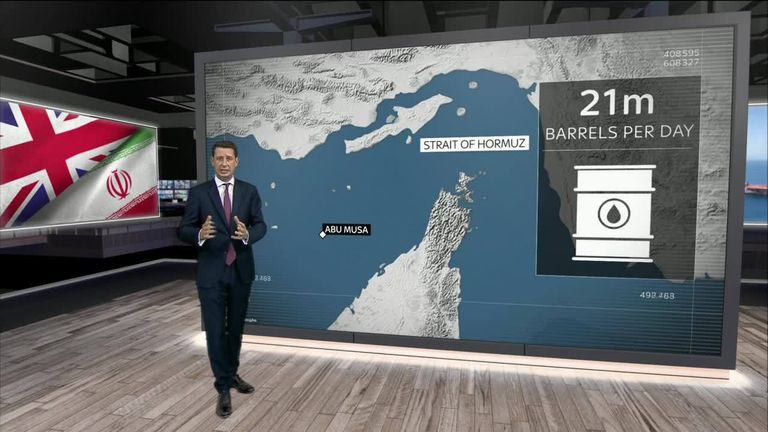Why the US and UK have different motivations in the Strait of Hormuz
The dispute is part of a wider struggle over the Iran nuclear deal that Donald Trump has ditched but Europe wants to save.
Friday 12 July 2019 15:30, UK
Britain does not want to escalate tensions with Iran but the United States appears to have other ideas.
There has been no increase in the number of British warships in the region despite a heightened risk to British-flagged vessels passing through the Strait of Hormuz.
Instead, the policy appears to be reprioritising tasks for the Royal Navy's assets already operating out of Bahrain - a frigate and four minehunters - to bolster maritime protection alongside allied navies. A Royal Fleet Auxiliary ship is also there.
Yet simultaneously, the US is seeking to build a coalition to provide military escorts to commercial vessels through the Gulf.
General Mark Milley, the White House's nominee to be America's next military chief, said on Thursday: "I think that will be developing over the next couple weeks."
Britain is waiting to hear about the US plan, but for now appears content with a heightened level of patrolling through the Strait of Hormuz, including intervening to ward off three Iranian patrol boats that attempted to block the passage of a British-flagged tanker on Wednesday.
It may be forced to do more, however, should Iran try again to target a British vessel.
The problem faced by the UK is that its decision last week to allow Royal Marines to help seize a tanker laden with Iranian oil allegedly bound for Syria when it was off the coast of Gibraltar is being seen in the Islamic republic as a significant escalation.
No matter how much Britain would like to keep the detention of the Grace 1 tanker separate from what was already a crisis in the Gulf region, Iran appears not to see such a distinction.
:: Listen to the Daily podcast on , , ,
Instead it feels within its rights to challenge British-flagged merchant ships passing off its coastline in "retaliation".
This must all be viewed through the lens of a wider struggle between Iran and the US over a nuclear deal that President Donald Trump has ditched but European allies, including Britain, want to save.
The desire to keep Iran onside with the deal makes increasing a military presence in the Gulf less appealing, as it would be seen as aggressive by Iran.
The US does not have that consideration. In fact, moving an aircraft carrier task group, B-52 bombers and additional military personnel - as it has done - to the region compliments its policy of maximum economic pressure on Tehran as it tries to bring officials back to the negotiating table.
This could mean Washington will struggle to win support from Britain and other European navies for a bespoke new force in the Gulf to provide escorts and surveillance aircraft for commercial ships - unless there is another attack on tankers that can be blamed on Iran.






